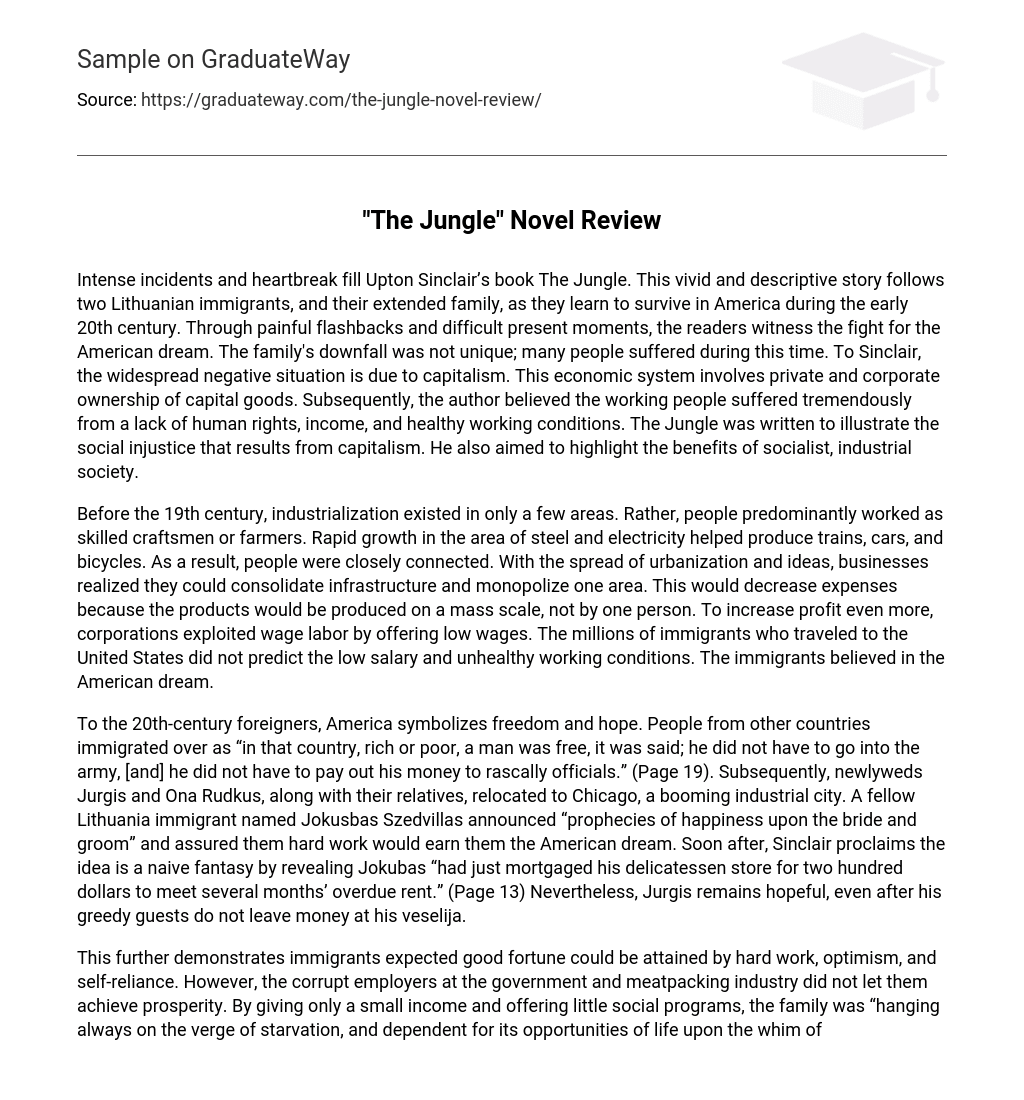Intense incidents and heartbreak fill Upton Sinclair’s book The Jungle. This vivid and descriptive story follows two Lithuanian immigrants, and their extended family, as they learn to survive in America during the early 20th century. Through painful flashbacks and difficult present moments, the readers witness the fight for the American dream. The family’s downfall was not unique; many people suffered during this time. To Sinclair, the widespread negative situation is due to capitalism. This economic system involves private and corporate ownership of capital goods. Subsequently, the author believed the working people suffered tremendously from a lack of human rights, income, and healthy working conditions. The Jungle was written to illustrate the social injustice that results from capitalism. He also aimed to highlight the benefits of socialist, industrial society.
Before the 19th century, industrialization existed in only a few areas. Rather, people predominantly worked as skilled craftsmen or farmers. Rapid growth in the area of steel and electricity helped produce trains, cars, and bicycles. As a result, people were closely connected. With the spread of urbanization and ideas, businesses realized they could consolidate infrastructure and monopolize one area. This would decrease expenses because the products would be produced on a mass scale, not by one person. To increase profit even more, corporations exploited wage labor by offering low wages. The millions of immigrants who traveled to the United States did not predict the low salary and unhealthy working conditions. The immigrants believed in the American dream.
To the 20th-century foreigners, America symbolizes freedom and hope. People from other countries immigrated over as “in that country, rich or poor, a man was free, it was said; he did not have to go into the army, [and] he did not have to pay out his money to rascally officials.” (Page 19). Subsequently, newlyweds Jurgis and Ona Rudkus, along with their relatives, relocated to Chicago, a booming industrial city. A fellow Lithuania immigrant named Jokusbas Szedvillas announced “prophecies of happiness upon the bride and groom” and assured them hard work would earn them the American dream. Soon after, Sinclair proclaims the idea is a naive fantasy by revealing Jokubas “had just mortgaged his delicatessen store for two hundred dollars to meet several months’ overdue rent.” (Page 13) Nevertheless, Jurgis remains hopeful, even after his greedy guests do not leave money at his veselija.
This further demonstrates immigrants expected good fortune could be attained by hard work, optimism, and self-reliance. However, the corrupt employers at the government and meatpacking industry did not let them achieve prosperity. By giving only a small income and offering little social programs, the family was “hanging always on the verge of starvation, and dependent for its opportunities of life upon the whim of men every bit as brutal and unscrupulous as the old-time slave drivers.” (Page 89) Consequently, their aspirations about sufficient lifestyles disappeared. Only sadness and the terrible conditions remained.
Such a dismal setting was purposefully created. The author understood most people feel sad and pitiful when watching others suffer. By inspiring sympathy, the readers would blame America’s capitalist system for all misfortunes. However, this proved difficult because foreigners were viewed as threats to society. Sinclair first reduced the stereotype by opening the story at Ona and Jurgis Rudkus’s Lithuanian wedding. The event is filled with dancing, refreshments, and celebrations. By illustrating the people’s happiness, Sinclair shows they possess traditional American core principles: family, community, and optimism.
As the story continues, the need for nourishment and support destroys the American family dynamic. For example, after giving birth to her son, “Ona went back to Brown’s and saved her place and a week’s wages.” (Page 90) Consequently, she cannot be a mother to her infant. At this moment, Sinclair illustrates that capitalism stops families from spending time together. Additionally, he claims people cannot financially advance through supportive social values and hard work. Instead, citizens must resort to criminal activities, as seen by Jurgis finding a rich man and “ripping open, first his overcoat, and then his coat, and then his vest, searching inside and outside, and transferring the contents into his own pockets.” (Page 209)
Examples of how ineffective the capitalist system continues for the bulk of the book. In the last few chapters, Sinclair offers a solution to the distress: socialism. Socialism is the idea “that if the people cut off the share of those who merely “owned”, the share of those who worked would be much greater.” (Page 271) Along with the increase in income, the government would be free of corruption. In Chicago, the democratic system supported the criminals and the big businessmen. For example, electrons were rigged and “the police captain would own the brothel he pretended to raid.” (Page 211) The changes, however, cannot be made by only one person. Sinclair claims the working class must support change outside of the current system. If successful, the jungle will disappear.





